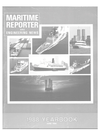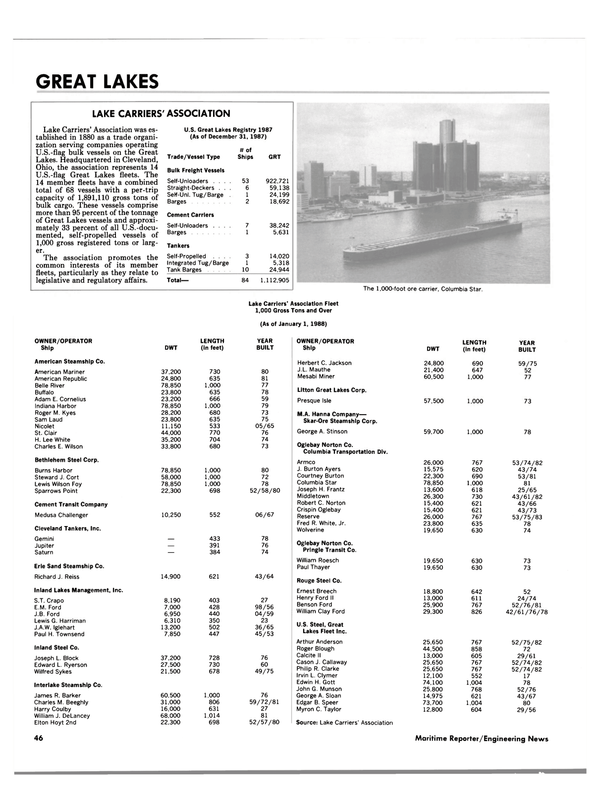
BARGE INDUSTRY WAITS FOR CONGRESSIONAL ACTION ON HIGHWAY DIESEL TAX
A recent report from the AWO (American Waterways Operators, Inc.) detailed the current situation regarding the Highway Diesel Tax.
The AWO reported that during Omnibus Budget Reconciliation talks last year, Congress changed the highway tax collection procedures from collection at the pump to collection at the wholesale level to prevent "cheating" by highway users (the tax goes to the Highway Trust Fund). Although they exempted non-highway users such as railroads and airlines, Congress simply neglected the water transportation industry, the construction industry and the farmers. Although the tug and barge industry, the construction industry and the agricultural community did all they could to keep this unfortunate oversight from becoming law April 1, 1988, they were frustrated in their attempts.
Thus, on April 1, the inland and coastal barge and towing industry began paying an additional 15.1 cents per gallon for diesel fuel—of which the industry consumes up to 2 billion gallons annually. (This is on top of the 10 cent per gallon diesel fuel user tax which the industry currently pays.) Although the tug and barge industry is eligible for a re- bate of these additional funds, the Treasury Department estimates that rebates could take up to 18 months. This prompted the Florida Times-Union to write "the maritime industry is about to provide the federal government with a $360- million interest-free loan." And, The Wall Street Journal wrote, "farmers and other off-road users of diesel fuel who are exempt from the tax are outraged by the provision because it requires them first to pay the tax then to file for refunds." Therefore, the industry—one that is only now beginning to come out of a crushing economic depression— will be floating a $240 to $360-million interest-free loan to the federal government, and experiencing severe and crippling cashflow problems that could well ruin many, many companies.
Other publications seem to concur with the water transportation's position.
"Big brother in Washington often works in strange ways to dip into our pockets—as the U.S. tug and barge industry has been made painfully aware."—The Mobile Register "Waterway operators are in a state of high anxiety over a recently implemented requirement changing the point of collection of a 15-centa- gallon excise tax on diesel fuel."— The Journal of Commerce "The barge industry is caught in a Catch-22 position involving excise taxes that it is legally required to pay, even though those payments resulted from an acknowledged mistake by Congress."—Traffic World The inland and coastal tug and barge industry is looking for Congress to help now.
The Senate Finance Committee has already moved to exempt water carriers from the requirement that this tax be paid up front. The House Ways and Means Committee has begun to look at the problem too.
But they left for recess before finishing the job. Payment began on April 1. Although over 20 bills have been introduced to correct this inequity, nothing has been done to move forward. Every day, barge and towing companies are being economically drained.
Both Sen. Lloyd Bentsen (D.- Texas), Senate Finance Committee Chairman, and Rep. Dan Rostenkowski (D.-Ill.), House Ways and Means Committee Chairman, asked Treasury Secretary James Baker to delay implementation of the payment requirement for non-highway users, giving Congress time to find "...an effective but practical method of collection of the diesel excise tax," as Chairman Rostenkowski said in his letter to Secretary Baker.
The Secretary's response was, to paraphrase, "you guys fouled it up, now you guys fix it." The Internal Revenue Service recently decided to allow certain waterway operators (on the inland waterways alone) to offset payment of the inland waterway fuel tax against the new tax payments for the highway diesel fuel tax. However, this provides no relief for the hundreds of coastal water transportation companies, and only partial relief for others.
The tug and barge, along with hundreds of thousands of farmers and construction workers, are stuck in a classic bureaucratic nightmare.
To the extent possible, they are mobilizing their member companies to plead their case on Capitol Hill.
No other issue in recent memory has cut so deeply into the newly jumpstarted economic heart of the industry.
Read BARGE INDUSTRY WAITS FOR CONGRESSIONAL ACTION ON HIGHWAY DIESEL TAX in Pdf, Flash or Html5 edition of June 1988 Maritime Reporter
Other stories from June 1988 issue
Content
- Castrol Offers Free 56-Page Lube Oil Guide & World Service Directory page: 6
- ODECO's Hugh J. Kelly Elected Chairman Of NOIA At 16th Annual Meeting page: 7
- $4.3 Million To Peterson Builders To Administer Navy Parts Acquisition page: 8
- John Kristen Joins Ingram Barge Company page: 10
- Service Marine Christens 600-Passenger Paddlewheeler For Heritage Cruise Lines page: 10
- World's Largest Railway/Freight Ferry Launched By Seebeckwerft page: 11
- NASSCO Announces Production Management Realignment page: 11
- SPD Technologies Negotiating To Acquire Navy Division Of Brown Boveri Power Equipment Inc. page: 11
- Munson Manufacturing Launches Alaskan Excursion Boat For Holland America-Westours page: 12
- MSC Awards Contracts Totaling $154.2 Million page: 14
- 1,000th Golar Marine Incinerator To Be Installed page: 14
- Skuld Undergoes Major Changes In Structure page: 15
- Report 'Genesis System' Can Produce Record Fuel Savings For Vessel Owners page: 16
- Bailey Controls Completes Installation Of N e w Flow Calibration Laboratory page: 16
- Houma Fabricators A w a r d e d Contract For Vehicle-Passenger Ferry page: 17
- Brochure Available On N e w Sound Absorption Material From Soundcoat page: 18
- John M. Stebbins Named VP, Sales And Marketing Of Alco Power Inc. page: 18
- Gladding-Hearn Receives Order For INCAT-Design Passenger Ferry For N e w York Commuter Service page: 20
- SPD Technologies Names Biancamano Manager, International Marketing page: 20
- Intertek Offers Free Eight-Page Full-Color Brochure On Services page: 21
- Blount Christens 'Spirit Of Chicago' —7th Luxury Dinner Vessel In 'Spirit' Line For Cruise International page: 22
- Marathon LeTourneau Introduces New GulfKing Class Jackup For Gulf Of Mexico page: 23
- THE $34-BILLION ANNUAL U.S. NAVY MARKET page: 24
- SHIPBUILDING AND REPAIR IN U.S. SHIPYARDS page: 40
- The Tug And Barge Industry Provides A Wealth Of Benefits To American Consumers page: 44
- BARGE INDUSTRY WAITS FOR CONGRESSIONAL ACTION ON HIGHWAY DIESEL TAX page: 44
- REVIEW AND OUTLOOK page: 62
- World Shipbuilding page: 64
- Cummins-Powered Paddlewheeler Delivered By Superior Boat Works page: 76
- Leslie Controls Announces DLO-1 Series 80 Valves page: 77
- Aeroquip Offers Hydraulic Troubleshooting Bulletin page: 77
- HDW Christens Two Containerships For American President Lines page: 78
- Bender Shipbuilding Delivers Fish Processing Vessel 'Seattle Enterprise' page: 78
- DEFCO Offers Free Literature On Diesel Products And Services page: 79
- Waugh Offers Literature On Head Modules And TNF Joiner Systems page: 79
- Electrocatalytic Acquires DEM Cell Technology page: 80
- McElroy Offers Free 47-Page Brochure On Deck Machinery page: 80
- Indicator Switch From Nupro Connects To Air Actuated Bellows Valves page: 81
- Spare Parts Amendment Passes House page: 81
- Shipyard 'Pride Program' Instituted At PSRY page: 82
- Ward Offers Brochure On Manufacture Of Marine Components page: 82
- Conrad Industries Delivers 650-Ton-Capacity Drydock To French West Indies page: 83
- Sensitive Regulator From Circle Seal Assures Accuracy For Corrosive Or Ultra-Pure Fluids page: 84
- Watercom Offers Extra Convenience Of Fax Machine Message Transmission page: 84
- Simrad Receives Canadian Contract page: 85
- Houston Ship Repair Busy With Work page: 86
- Stewart & Stevenson Expands Diesel Engine Sales/Service Network page: 88
- Sperry Marine Awarded Submarine Navigation Radar Contract page: 89
- Rexroth Introduces N ew Hydraulic Radial Piston Motor page: 89
- Trimble Introduces NavGraphic Loran Track Plotter, And New Digital Version Of 10X Loran page: 90
- Conrad Industries Sees Signs Of Optimism In Offshore Industry page: 90
- SPD Technologies Names Larry Colangelo Senior VP page: 91
- Moss Point Marine Delivers Second Of Four Army Landing Craft page: 92
- Bath Iron Works Launches Guided Missile Cruiser 'Normandy' page: 92
- PetroCom Completes First C e l l u l a r / S a t e l l i te Phone Service in Gulf Of Mexico page: 93
- Joseph Le Blanc Jr. Retires From Trinity Marine Group page: 93
- Derecktor Shipyard Lays Keel For First Of Two Tugboats For U.S. Army page: 94
- Wartsila Diesel Presents Paper At ASTM Symposium page: 94
- Hyde Offers Independent Power Unit Systems To Meet SOLAS Requirements page: 95
- SKF Introduces Keyless Bushing; Will Market Nilos Rings In U.S. page: 95
- McDermott Shipyard Delivers 1,475-Passenger Ferry page: 96
- M o n A r k ' s Workboat Division Delivers 28-Foot Patrol Boat page: 97
- Raytheon Marketing New Electromagnetic Speedlog Series page: 98
- Call For Papers For American Welding Society's 70th Annual Convention page: 99
- COMSAT A n d MCI Sign Interconnection Agreement page: 100
- N e w 138-Page Level And Flow Sensor Catalog O f f e r e d Free By GEMS page: 100
- Gems Offers 24-Page Catalog Featuring Continuous Liquid Level Indicating Systems page: 110
- Crew And Supply Boat Conversion Can Be A Profitable Venture page: 113
- Tom Bunyan, Inventor Of 'Pilgrim' Products Marketed By Mapeco, Honored By Queen Elizabeth page: 114
- Comsat Announces SafetyNet Service For Ships At Sea page: 115
- N e w Class DBOY-2 Valve Line N o w Available From Leslie Controls, Ltd. page: 115


